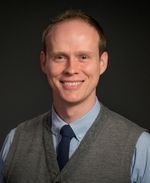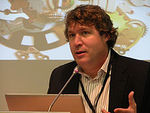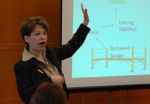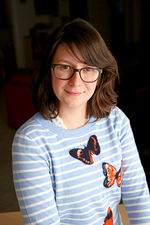Learning Analytics Workshop - faculty: Difference between revisions
From Santa Fe Institute Events Wiki
No edit summary |
No edit summary |
||
| Line 52: | Line 52: | ||
Professor Klopfer's research focuses on the development and use of computer games and simulations for building understanding of science, technology, engineering and mathematics. He works on mobile and onlines games designed to build understanding of scientific practices and concepts as well as critical knowledge. In the realm of simulations, Klopfer's work focuses on students understanding complex systems through, and connecting computer programming with, scientific practice, critical thinking, and real-world issues . He is the co-author of the books, "Adventures in Modeling", "The More We Know", as well as author of "Augmented Learning," Klopfer is also the co-founder, past President, and Board Member of the non-profit Learning Games Network. | Professor Klopfer's research focuses on the development and use of computer games and simulations for building understanding of science, technology, engineering and mathematics. He works on mobile and onlines games designed to build understanding of scientific practices and concepts as well as critical knowledge. In the realm of simulations, Klopfer's work focuses on students understanding complex systems through, and connecting computer programming with, scientific practice, critical thinking, and real-world issues . He is the co-author of the books, "Adventures in Modeling", "The More We Know", as well as author of "Augmented Learning," Klopfer is also the co-founder, past President, and Board Member of the non-profit Learning Games Network. | ||
[[image:gsiemens.jpg|150px|{border}]] <br> | |||
'''[https://en.wikipedia.org/wiki/George_Siemens George Siemens],''' Executive Director of the Learning Innovation and Networked Knowledge Research, University of Texas, Arlington <br> | |||
George Siemens is a writer, theorist, speaker, and researcher on learning, networks, technology, analytics and visualization, openness, and organizational effectiveness in digital environments.[1] He is the originator of Connectivism theory and author of the article Connectivism: A Learning Theory for the Digital Age and the book Knowing Knowledge - an exploration of the impact of the changed context and characteristics of knowledge. <br> | |||
[[image:lorib.jpg|150px|{border}]] <br> | [[image:lorib.jpg|150px|{border}]] <br> | ||
Revision as of 16:44, 6 September 2016
| Working Group Navigation |
Panelists

Ari Bader-Natal, Principal Learning Architect at Minerva Project
For the past 15 years, I've focused on designing and building social learning environments on the web. During this time, I've helped to create several different venues for learning, including Minerva's signature seminars, Grockit's adaptive algorithms, Sketchpad's coding collaborations, and Spellbee's child-constructed challenges. Each of these systems has offered opportunities to test, evaluate, and share new methods for supporting collaboration, engagement, and learning. Since 2012, I've been the Principal Learning Architect at Minerva Project, where I design and build new technologies to support teaching and learning at Minerva, including early work on the Active Learning Forum, technologies facilitating formative and summative assessment, and a collaborative tool for course design and development.
Prior to Minerva, I was Chief Learning Architect at Grockit, where I helped develop the company's core social learning and assessment technologies, designed a system for educational data analysis and learning analytics, and led all research initiatives. In 2011, I developed Grockit Answers to enable productive peer-to-peer learning around educational videos.
Outside of work, I enjoy building tools for collaborative learning in an informal environment. In 2010, I launched Studio Sketchpad, a website for creative coders to collaboratively author and share interactive animations and data visualizations written in Processing. Five years after starting Sketchpad, I still check in regularly to see what people are building and to highlight some of my favorites in the Gallery. Sketchpad has been used in an educational setting at over 100 universities, high schools, and coding workshops around the world.
I completed my PhD in Computer Science at Brandeis University in 2008. In my dissertation work, I examined the possibilities of motivating learning among peers by incorporating these interactions into a game. This drew on a combination of game theory, system design, and a statistical analysis of data from tens of thousands of kids practicing spelling online. Here's a tough one: accommodation.

Daniel Seaton, VPAL Research Scientist, Harvard University
Dr. Daniel Seaton received his B.Sc. in Physics from Auburn University, and his Ph.D. in computational physics from the University of Georgia. While in graduate school, Daniel developed a passion for teaching and scholarship in education. This passion led him to a series of postdocs at MIT, the first in physics education research, and the second as researcher studying Massive Open Online Courses (MOOCs). His early work studying MITx and HarvardX MOOCs culminated in a series of working papers, and foundational results showing teachers make up a significant number of MOOC enrollees. After briefly working as a data analyst in MIT's Office of Institutional Research, Daniel shifted to Davidson College to work on the Davidson Next project. His primary roles have involved developing interactive assessment applications within the edX platform, adapting tools to support high school teachers’ use of MOOC content in blended formats, and studying learning behavior using data captured by the edX platform.

David Pritchard, Cecil and Ida Green Professor of Physics, MIT
Professor David E. Pritchard is a principal investigator of the Research Laboratory of Electronics (RLE) at the Massachusetts Institute of Technology (MIT).
Professor Pritchard carried out pioneering experiments on the interaction of atoms with light that led to the creation of the field of atom optics. His demonstration of the diffraction of a beam of atoms by a grating made of light waves opened the way to studies of the diffraction, reflection, and focusing of matter waves, similar to those with light waves. He has applied atom optics to basic studies of quantum theory, to new methods for studying the properties of atoms, and to the creation of devices such as the atom interferometer and atom wave gyroscope.
Professor Pritchard’s investigations in atom-light interactions also led him into the field of laser cooling where he made a number of pioneering contributions, including the work that led to the creation of the magneto-optical trap. This device became the workhorse in atom cooling experiments, including most studies of Bose-Einstein condensation. In 1990, he brought Wolfgang Ketterle to MIT as a postdoctoral researcher to work on atom cooling, and stepped aside from that field to allow Ketterle to be appointed to the faculty in 1992. Ketterle pursued atom cooling to achieve Bose-Einstein condensation in 1995, a discovery for which he was awarded the Nobel Prize in physics in 2001, along with Eric Cornell and Carl Wieman of JILA, Boulder, CO. Professor Pritchard also mentored Eric Cornell, who was his graduate student. Professor Pritchard is currently collaborating with Ketterle to merge Bose-Einstein condensation with atom optics, using the atom laser as a source of coherent atoms for basic studies in quantum physics, new types of atom interferometry, and possibly to applications in nanotechnology and quantum computing.
Professor Pritchard is also a dedicated teacher. During the past few years he has developed a computer-based tutorial for elementary mechanics called Cybertutor, which has been used successfully in versions of 8.01: Physics I.
Professor Pritchard received his B.S. from California Institute of Technology and his Ph.D. from Harvard, working with Professor Daniel Kleppner, who soon thereafter came to MIT, bringing Pritchard with him as a postdoctoral fellow. Pritchard joined the faculty of the Department of Physics in 1970. He has many honors, including the Broida Prize of the American Physical Society. He is a member of the National Academy of Sciences and is a Fellow of the American Academy of Arts and Sciences.

Yuan Elle Wang, Researcher of Cognitive Studies with a concentration in Intelligent Technologies and Learning Analytics at Columbia
My name is Elle Yuan Wang. I’m a PhD student studying Cognitive Studies with a concentration in Intelligent Technologies and Learning Analytics at Columbia University. I spend most of my time modeling learner behavior and motivation within Massive Online Open Courses (MOOCs). Welcome to take a look at my Projects. I’m also a professional translator/interpreter and journalist. Currently, I write for Voyage , a fashion and travel magazine. Counter-intuitively, I also work with the Chinese editions of Scientific American and Nature magazines.
Past: I was a 2011 Social Media Research Fellow with Mayor Bloomberg’s Office; Marketing and Communication Officer of Columbia Technology Ventures; Special Projects Officer with Columbia University Office of the President; Music Ambassador with Carnegie Hall; Youth Sub-committee Member of UN Department of Public Information; Strategy, Insights, and Research Intern with MTV Networks, Correspondent with China Daily...
I care about anything related to enhancing people’s learning experience. And I believe that is the way to achieve happiness.

Eric Klopfer, Santa Fe Institute External Faculty; Professor/Director, Massachusetts Institute of Technology, Urban Studies & Planning/Scheller Teacher Education Program
Professor Klopfer's research focuses on the development and use of computer games and simulations for building understanding of science, technology, engineering and mathematics. He works on mobile and onlines games designed to build understanding of scientific practices and concepts as well as critical knowledge. In the realm of simulations, Klopfer's work focuses on students understanding complex systems through, and connecting computer programming with, scientific practice, critical thinking, and real-world issues . He is the co-author of the books, "Adventures in Modeling", "The More We Know", as well as author of "Augmented Learning," Klopfer is also the co-founder, past President, and Board Member of the non-profit Learning Games Network.

George Siemens, Executive Director of the Learning Innovation and Networked Knowledge Research, University of Texas, Arlington
George Siemens is a writer, theorist, speaker, and researcher on learning, networks, technology, analytics and visualization, openness, and organizational effectiveness in digital environments.[1] He is the originator of Connectivism theory and author of the article Connectivism: A Learning Theory for the Digital Age and the book Knowing Knowledge - an exploration of the impact of the changed context and characteristics of knowledge.

Lori Breslow, Founding Director Emeritus - Senior Lecturer, MIT Sloan School of Management
Lori Breslow, Ph.D., was the Director of the Teaching & Learning Laboratory (TLL) from its inception in 1997 until July 2015. She is an internationally recognized expert in higher education, specifically in the development and diffusion of pedagogical and curricular innovations and their assessment and evaluation.
She has been involved in a number of national and international initiatives to improve STEM teaching and learning, including collaborating with the Singapore University of Technology and Design; co-directing the Teaching for Learning Network, a partnership between MIT and the University of Cambridge; and serving as a faculty educator for the Masdar Institute of Science and Technology in Abu Dhabi. She was a visiting scholar at Cape Peninsula University of Technology, Cape Town, South Africa, and the Center for New Designs in Learning and Scholarship, Georgetown University. Her articles have appeared in Change: The Magazine of Higher Learning and Journal of Science Education and Technology, among other publications. She has lectured at Oxford University, the University of Utrecht, Edinburgh University, the University of Queensland, and Organisation for Economic Co-operation and Development (OECD).
She is a member of the advisory boards of the Higher Education Teaching and Learning Portal and The Center for New Curriculum Redesign, and a past member of the Journal of Engineering Education's editorial board, MIT's MIT's OpenCourseWare Assessment and Evaluation Advisory Board, and MIT's Council on Educational Technology.
Dr. Breslow is a Senior Lecturer in the MIT Sloan School of Management where she teaches courses in academic and professional communication. Her research interests are in interdisciplinary education and the diffusion of educational innovation. Her doctorate is in communication and culture from New York University, and her B.A. is in history from Indiana University.
Event Contact

Juniper Lovato, Director of Education, Santa Fe Institute
Email: juniper@santafe.edu
